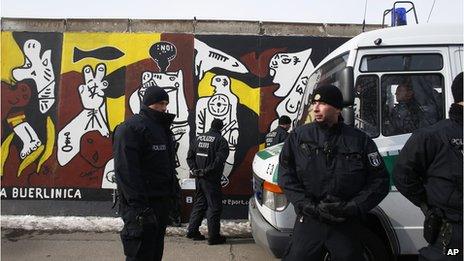Historic Berlin Wall section removed amid protests
- Published

A German property developing firm has removed parts of a historic stretch of the Berlin Wall amid heavy police presence, despite a week of protests.
Builders removed four segments of the so-called East Side Gallery stretch on Wednesday morning to open access to a building site for blocks of flats.
Some 250 police officers were deployed as the sections were dismantled.
The re-development project has sparked outrage among citizen groups, who say the site is a symbol of freedom.
Workers tried to dismantle the segments on 1 March but were forced to halt their plans when angry demonstrators blocked their path. Another small part of the stretch has already been removed.
Set on the banks of the River Spree, the East Side Gallery is the Wall's longest remaining stretch, measuring 1.3km (0.8 miles).
It became one of the city's most visited attractions in the early 1990s after international artists painted its concrete surfaces with strong, often irreverent images depicting, for example, Soviet and East German leaders locked in a kiss, BBC Berlin correspondent Stephen Evans reports.
But in recent times it has turned into a symbol for the gentrification of the new Berlin, with property developers seeking to build apartments along the river, our correspondent says.
Headache
On Wednesday at 05:00 (04:00 GMT), workers took down four chunks measuring around 1.2m to make space for a construction site gate, police said.
"We are here on the one hand to enable [builders] to continue their construction work and on the other side we want to welcome people who want to protest against this and finally allow them to stage their protest," police spokesman Volker Alexander Toennies said.
No incidents took place during the early morning removal but German media reported a growing number of protesters at the site.
In total, 22m will be taken down for the riverside flats.
Although the stretch was heritage-listed in 1991, the protection applies only to the wall itself, not to the land it stands on.
The missing segments will be replaced once construction work is completed, the building project's private investor, Maik Uwe Hinkel, has told Germany's Bild newspaper.
The re-development plan has caused a major headache for all parties involved.
The East Side Gallery falls under the authority of the Friedrichshain-Kreuzberg district, which gave the green light for the new flats.
But the ensuing public controversy has forced Berlin mayor Klaus Wowereit - a critic of the project - to become involved in negotiations and propose alternatives to the wall's removal.
On Tuesday evening, talks between Mr Wowereit, local district authorities and the property developer failed to reach an agreement, German media report.
The issue is a part of a continuing debate in Berlin as the city morphs from one with little money - poor but cool, as one mayor put it - into a global magnet for the fashionable and rich, our correspondent says.
- Published1 March 2013